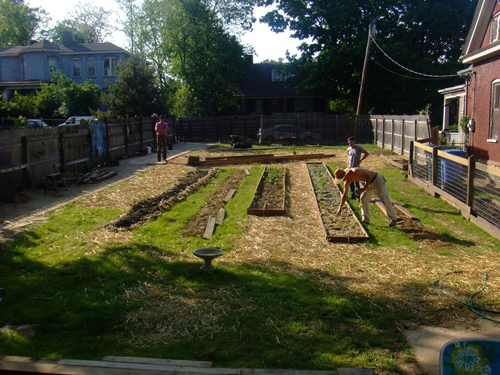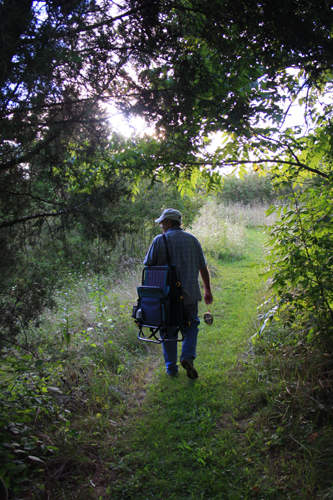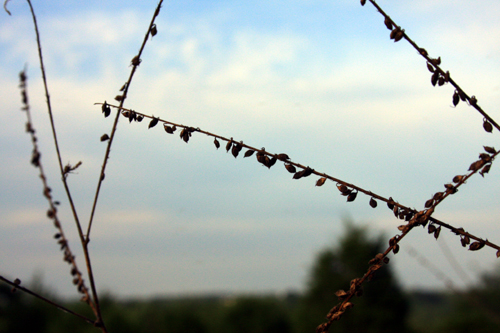|

Poke berries, ripening on stem.
(*photo credit)
August 1, 2010
Spiritual Motivation: Becoming Truly Secure
"My
soul, you have plenty of good things laid by for many good years to
come; take things easy, eat, drink, have a good time." (Luke
12:19)
This kind of
foolishness is never far from most people's minds when a little
extra material security happens to come their way. The added stuff
will carry one over for an indefinite future -- or will it? Perhaps
God has other plans for all of us. The foolish ones forget that
material security is an illusion, and yet money and material things
mesmerize many who think that the more plentiful the possessions,
the better prepared for the future. Few reflect that spacious
villas crumble, fields erode, and fleets of vehicles need servicing,
protection and sometimes crash. Unfortunately, the foolish do not
look beyond the immediate wants and have no long-term future in
mind. Where are the deeper spiritual and lasting motivations?
At
the death of confirmed materialists or those who put trust in
political or economic power, we pause and ask ourselves some basic
questions. What moves us? Were we envious of their achievements
and now feel triumphal that theirs was no lasting city? Do we gloat
that their peers, followers, relatives and neighbors are like
lemmings rushing to the sea of mortality? Do we have a perverse
satisfaction in their ending? Are we powerless to change the
foolish motivations of others when our own are imperfect? Here are
some approaches in our discussions with them:
Materialists
act foolishly. Jesus gives us the primary way to view the quest
for material wealth and security. Within our community are people
who work hard for such gain and then something strikes them, whether
cancer or a speeding car or mental difficulties. Their material
empire fades virtually overnight and many of their efforts seem to
have been in vain.
Giving
people are at peace. The second approach is to show spiritual
benefits resulting through giving of self for others. Most likely
such people are all around us, if we but look out and observe
carefully. They are the selfless caregivers who seem to always have
enough and yet share radically with others. If we trust in God and
strike out to help our neighbor, the Lord provides in ways we do not
at first anticipate.
Material
gain can be frustrated. Confront materialism by pressing for
removal of the excessive gains of those who need to share with the
ones who have little. Challenge youth who are bent on the road to
material success to see the futility of such strivings. Health and
education costs are high and need to be provided for, especially for
those under one's charge. But what is enough? When do we stop?
How do we attend to other basic needs? Can one easily perceive the
addictive nature of material things?
Prayer:
Lord teach me spiritual motivation and to see this so clearly that
it becomes evident in the world in which we live.

Red admiral butterfly, Vanessa atalanta.
(*photo by Sally Ramsdell)
August 2, 2010
Coal Ash: Searching for a Greener
Solution
In
December, 2008, the coal ash impoundment at the Tennessee Valley
Authority Kingston Fossil Plant collapsed, and 5.4 million cubic
yards of coal fly ash sludge escaped and damaged homes and
contaminated the Emory River. Cleanup costs are over one billion
dollars to date. Coal ash storage is present in over five hundred
U.S. sites and constitutes a problem. The 150 million tons
generated annually in the U.S. is regarded as second only to mining
wastes in the total American waste stream. Real puzzles challenge
us, namely, how do we reuse this potential resource?
Environmentalists are quick to point out that this ash contains
lead, arsenic, mercury and chromium and several metals toxic in
large quantities but, in some cases, essential in trace amounts.
Chemical analyses show these metals entering waterways when barriers
break as at Kingston. Some folks scratch their heads saying,
"Aren't these substances found in coal naturally?" For them the
problem is failure to use all the large amounts of combustion
products. "Isn't manure a good fertilizer when scattered but a
stinking mess when heaped?" This puzzle is harder because simply
scattering ash is not a good solution.
Regulators
know that the immense amount of coal ash is a puzzle; they are
caught in conflicting demands from various interest groups and thus
have avoided any specific regulation. Many environmentalists want
to treat coal ash as a hazardous waste. The U.S. Environmental
Protection Agency (EPA) has vacillated through the
year-and-a-half-old Obama administration. Regulatory proposals have
been changed, deleted, appended and essentially rewritten. Two
options emerge under the Resource Conservation and Recovery Act:
Subtitle C regards coal ash as a hazardous material requiring
federal monitoring and control of handling, transportation, disposal
and reuse (coal ash is currently used in a host of applications);
Subtitle D treats coal ash as a waste material as is
household garbage (here the EPA has little management authority).
Obviously, many environmentalists opt for the first option and see
the hand of special interest groups in textual changes in the
working document; for them, an extended rule-making period has led
to weakening of original regulatory proposals. The White House
Council on Environmental Quality, along with other governmental
agencies including USDA, has opposed this Subtitle D approach.
Business and some in government believe that designating coal ash as
hazardous will reduce reuse possibilities.
Let's consider a second practical environmental perspective, namely
an aggressive reuse program ensuring "locked" reuse of coal ash and
little prospect of escape. The wisdom of Solomon could apply to the
coal ash puzzle. Emphasis on encouraging enterprising users to help
rid powerplants of waste, is safer than rules to contain ash over
time. We need to regard the ash as a resource and encourage its use
in beneficial industrial and other applications.
Prayer:
Lord, teach us to use our waste products wisely.

Pink-tinged color of dry-site Queen Anne's lace, Daucus carota.
(*photo credit)
August 3, 2010
Environmental Solutions: Work and Pray
Yesterday
we mentioned the "Coal Ash Puzzle," and ended with a short prayer
that wisdom be gained. We do not want to give the impression that
prayers at the end of reflections are afterthoughts. Rather, the
intent of our "Daily Reflections" is that solutions to real problems
will only be achieved in the milieu of respectful and earnest
prayer.
Work
in solving environmental problems is of utmost importance. One
could not reach long-term solutions if the howling mob is ready to
lynch those giving a "wrong" outcome. Physical circumstances demand
a certain tranquility, proper work conditions, cooperating team
workers, access to all the required information and a regulatory
atmosphere wherein agreements are translated into policy, action and
enforcement. Work is certainly essential on all fronts. However,
the elements listed are not sufficient for longer-term solutions.
Secular problem-solving goes only so far when it comes to healing
our wounded Earth.
Prayer
is also of utmost importance, for through prayer we --
1.
Enhance mutual respect for all parties involved in solving the
problem. A respect for God extends to respect for all human beings
and for the flora and fauna of our planet as well. All creation is
part of the glory of God, and in an atmosphere of thankfulness we
find our part in the creative process, and we do this with
enthusiasm -- the God within;
2. Recognize
the seriousness of issues and avoid denying their existence. We can
see blatant faults in our world; we can begin the process of
remediation, but we do not see deeper causes without an atmosphere
of prayerful alertness. This requires a spirituality that does not
flee from problems but accepts the puzzles of our times as related
to social (and eco-)justice issues;
3. Take
responsibility for being part of the problem at least through
citizen neglect to act; the need is to participate in seeking
forgiveness for human mishaps whether caused by us or others. Let's
extend the blame as something social and ask God's forgiveness
through prayer. To accept blame is empowering, for we can see all
past mishaps as joint learning opportunities;
4.
Exude confidence that real solutions can be reached for the
benefit of all, and refuse to be tempted to move on to easier and
different matters. This confidence becomes contagious for it means
to involve all people, especially those so often overlooked in
problem-solving activity; and
5.
Show appreciation for all good gifts in our world.
Prayer:
Help us Lord, to teach a secular society of the power of prayer
in attacking the environmental problems of our age, and show those
who seem unconcerned that there is a duty to enter into the healing
process in a prayerful manner.

Summer bouquet of cone flowers.
(*photo credit)
August 4, 2010
Offshore Energy: Wind and/or Oil
We
hardly have to be reminded of the millions of barrels of oil that
have escaped into the Gulf of Mexico waters since April 20th. The
time it is taking to halt the gushing well has resulted in one of
the planet's most serious disasters. Fishing, tourism and the
quality of life along the entire Gulf Coast have been disrupted --
and then the blame game and lawsuits begin. Are the environmental
risks associated with fossil fuel extraction and use worth their
becoming part of the "essentials" of modern life? Renewable
energy, such as wind, solar, tidal, geothermal and some biofuel
sources, is a different matter; these sources are far more
environmentally benign and do not involve major risks.
The
offshore territories along the United States shores are immense, are
near one-third of our major population centers, and are in close
proximity to potentially large-scale offshore wind farms. Of
course, some Cape Cod residents have found their prized unobstructed
vistas threatened -- though their reasoning may try to hide such
motivations of privilege. If wind, the fastest growing American
energy source, replaces fossil fuels the air will be cleaner; and
wind farms bear far fewer environmental risks. Offshore wind is
like prairie wind; it produces needed electricity but is far closer
to major consumption areas. Utilizing offshore wind is a win-win
situation. This opportunity for energy also applies to the
transportation sector, fueled by a major portion of the 20 million
barrels of petroleum consumed in the U.S. each day. However, wind
is a candidate to furnish the electricity needed by a new generation
of vehicles now dependent on petroleum.
In
contrast, the drive to increase petroleum sources by expanding
offshore exploration and development has taken a hit, as average
Americans observe on TV, tourist beaches covered with tar balls,
marshes being threatened by the millions of gallons of seeping crude
oil, and fishing banned in the best fishery areas of our country.
All of this is the result of one deep-water oil well that has had an
accident. Petroleum extraction is risky (eleven died at the
ill-fated offshore rig fire), as is that of coal (two dozen American
miners were killed this past spring after underground extraction
mishaps -- and a host of Chinese and Russian miners as well).
Today
about one-third of our domestic petroleum supply comes from offshore
sources -- and the ill-fated Kerry-Lieberman energy bill contains
key provisions for expanded offshore drilling for petroleum. If the
funds slated for loan guarantees for expensive eight-billion dollar
nuclear powerplants and for research and expansion of oil and coal
utilization were channelled into low-polluting and far
less-expensive wind and solar energy sources, our nation would be on
the right track.
Prayer:
Lord, give us the vision to look beyond unobstructed offshore
vistas to see safer wind farms furnishing less threatening sources
of energy to satisfy our essential needs.

Fowler toad (Bufo fowleri) on slab of fossil-laden Lexington
limestone.
(*photo credit)
August 5, 2010
Hemp Reintroduction: The Time Has Come
In
a former reflection (see May 11, 2007) I mentioned changing my mind
on twenty-first century cultivation of hemp. While discussing
possible alternatives for former tobacco farmers in our just
released book, Tobacco Days, I could not give enough time to
any one crop alternative. With all the emphasis on reducing climate
change and curbing offshore, ruptured oil wells, the time for
natural fibers such as hemp is right. Need we be reminded that
American industry (e.g., DuPont with its Nylon) did a vast
disservice to American farmers by getting hemp banned in the 1930s
for supposed drug reasons (confusion with its cousin marijuana);
the real reason for the ban was to remove competition with the
emerging synthetic fibers derived from petroleum products. A false
drug charge did economic damage then just as a more valid reason is
reducing tobacco crop possibilities now. Let's redress past
grievances; hemp is environmentally more benign than extracting and
refining petroleum for synthetic fibers.
In
1859, central Kentucky was the hemp-growing capital of the nation
and really the world, since Kentuckians at the time prided
themselves on having better hemp than even the Czar's Russia. Just
before the Civil War, the U.S. produced 143,000,000 pounds of hemp
and half of that was in Kentucky; the Bluegrass State remained
number one in production with 88% of the acreage until the turn of
the twentieth century. Rope, twine, burlap sacks, wrapping for
cotton and canvas were all requiring immense quantities of fiber.
However, American hemp became a victim of both alternative practices
and outsourcing. Hemp, the substance with 25,000 uses (fiber, feed,
food and fortune), lost its luster with the demotion of sailing,
since steam-driven vessels that lacked sails did not need canvas and
rope (Kentucky Explorer, June, 2010 pp. 46-48). As time went
on, jute- and other hemp-growing regions of the world furnished
cheaper products for the American market, especially after the
demise of the slave farm economy.
Granted the reintroduction of hemp will require a capital investment
on the part of small farmers, but easy loans could get them started
in business, for the payback is quite promising. Potential
markets exist or will be reacquired through active promotion. Why
should not hemp be returned to the list of the major agricultural
crops on a par with corn, soybeans, cotton and wheat? It is a
healthy replacement for tobacco. Weak objections (especially when
marijuana is being legalized in other parts of our country) should
not stand in the way of hemp's reintroduction. Our farmers need
added income (and hemp can yield about 800 pounds or more per
acre). Furthermore, hemp is ecologically friendly and requires
little in commercial pesticides, cultivation or commercial
fertilizers. Finally, the agricultural history of the "momentum of
an early start" favors a high-quality product like American hemp.
Friends of agriculture need to get behind American hemp.
Prayer:
Lord, help us to find honest agricultural needs and to promote them
for the welfare of our farming families.

Rose of Sharon (Hibiscus syriacus) at the gate.
(*photo credit)
August 6, 2010
Transfiguration: A New Heaven and New Earth
The
verdant season of mid-summer stimulates us to reflect on our part in
renewing a troubled Earth. It is a perfect time to pause and
celebrate the feast of the Transfiguration.
To
transfigure means to transform or change the outer
appearance. The event we celebrate today is where Jesus is going up
the mountain with his chosen disciples and becoming exalted or
glorified in appearance along with Elias and Moses, an event that
foretold his glorious future -- and ours as well. This prefigured
the resurrection event that was to come for Jesus and thus gave him
the consolation and support that all human beings need. However,
the event and how to respond or celebrate it appear as mysterious to
us today as they did to Peter and the disciples two thousand years
ago. How do we celebrate this event by more than witnessing with
the disciples as spectators? Is there an aspect that involves us
along with the Lord in a participative manner?
Individuals
discover the glory ahead. We have our mini-transformations
through smiles each time the Lord gives us some consolation, some
sign that a glory road is ahead for us. This may be encounters in
natural settings (a sunset or sunrise, the glory of a morn in
spring, birds singing, etc.). At other times we experience
consolation at funerals of a faithful person; we hear that our
lives will be transformed, not ended, and this gives believing
survivors hope of what is to come. We are meant for the glory of
eternal life, and the glorious Liturgy, which celebrates the life of
the dead person, is a sure sign of future exaltation. Amid flowers
and music and communal prayer we have a solemn promise that glory
will come -- and this is a consolation for believers.
Communities
worship as one. What occurs at funerals when we need special
consolation also occurs for believers who gather in larger festive
celebrations. A festival or well-executed, major public event can
be the occasion when a transformation occurs in our attitudes to the
world around us. Our spirits are raised for the harder knocks of
life ahead, and this is something we really need. We see our
journey of life as suddenly highlighted.
A
New Heaven and New Earth are promised in Scripture. It is
fitting that our active participation is expected in the light of
the mandates given at Pentecost to spread the Good News. We are
more than spectators; we are actors on the stage of cosmic
transformation. The ordinary consolations, meaningful funerals and
grand liturgical celebrations inspire us. We are called to be
dispensing sharers of hope given to us through the empowerment of
the risen Lord. Our message is Transfiguration; we console those
who lose heart; all must work together and heal our wounded Earth.
Prayer:
Lord, give us the consolations that we need to keep going, and to
share these spirited happenings with others. Help us to experience
them with Jesus, our beloved brother who goes ahead of us in
glory. He is our promise of eternal life.

A lovely task for the buckeye butterfly (Junonia coenia).
(*photo by Sally Ramsdell)
August 7,
2010 Euphoria: A Worker's Attitude
Earlier
this year, my brother Frank and his wife Mary went to China for the
Shanghai World's Fair. In conversing with the people they met, they
observed a sense of euphoria among Chinese workers. It may have
been to some degree the selected people they were allowed to
contact, but they suspected it was a more general mood. The Chinese
they met explained their vigor and high spirits as stemming from the
experiences of their parents and the previous generation; those
unfortunate souls had experienced the horrible effects of the
cultural revolution and, as survivors, impressed on their offspring
the blessings of better working conditions. China seems to be a
nation making itself anew with massive outlays on building
infrastructure (railroads, highways, factories, apartment high rises
and parks) -- and the expansive mood is contagious.
Many
of us experience some euphoria in the work we do -- and only feel
limited by flagging energy levels and lack of time to allow the
attitude to grow on us. Maybe our culture is such that we are not
permitted to express the fact we enjoy our work and it gives us
energy; we may be restrained because so many of our compatriots are
un- or underemployed. We may feel that to express our own euphoria
is to rub salt into the wounds of those looking for work. I was
haunted by a recent picture in America magazine of a New York
City unemployment line and the looks on the faces of those standing
in line, especially that of the most prominent lead person; his
dignity seemed shaken and he had a forlorn almost despairing
expression on his face. "I can't compete."
We hearken back
to a suppressed film clip of one of Franklin D. Roosevelt's last
talks where he sought a guarantee of the "right to work" to be
guaranteed along with other of a new Bill of Rights. Why are we not
insisting on the right of every citizen to work as a privilege of
citizenship? Our nation certainly needs labor to rebuild and expand
a decaying infrastructure -- roads, bridges, trails, parks, and
educational facilities. We could accomplish this with a
twenty-first century version of the Works Progress Administration (WPA).
Why
shouldn't the funding sources be the public coffers? Does the
United States need to fund large military projects in which the cost
per dollar spent hires few Americans (e.g., ten people per million
dollars WPA-type versus two or three people per one million in
military expenditures). The best funding source may be redirected
military funding (57% of our total federal budget). Can we afford
to be "the policeman of the world?" America has real infrastructure
needs; we have people willing to work; we have military funds as
well as taxes from the wealthy and from breaking open the tax havens
(with task forces from other nations). Rebuilding America would
most certainly allow euphoria to grow.
Prayer:
Lord help us to roll up our sleeves and expand work opportunities
for all the unemployed -- and to find the funds to give them
employment.

Magnificent patterns of the blackberry lilies.
(*photo by Sally Ramsdell)
August 8, 2010
Destiny: The Best Preparation Is in Giving
When we
have had a great deal given to us on trust, even more will be
expected of us. (Luke 12:48)
Individually,
many people are unwilling or reluctant, or they loathe talking about
their ultimate destiny. Take a survey and find this subject utterly
unpopular, and yet it is as inevitable as taxes and death -- for it
follows the latter. Since some do not believe in eternal life,
believers living in a secular culture may feel restrained from
bringing up the subject. Our short-term perspective is often the
product of this culture; we speak openly about acquiring, servicing
and hoarding material things for near future use. Ultimate destiny
is not a proper subject in our polite society. Only slightly more
acceptable is a lateral destiny of gifts to be shared with those in
need here and now.
Peter
asks Jesus a good question: Is this message (Luke 12: 32-48) meant
for the disciples only or for the whole world? Lest we forget, all
Scripture has both an individual and a social message, and the story
of keeping our lamps burning and being watchful certainly applies
today, both because traditional fuel supplies are dwindling and
because we are often so distracted by other things. However,
destiny includes individual and social levels as well as current
(spatial) and future (temporal) dimensions.
Individually,
we believers strive for an eternal destiny, and show our
appreciation for that promised destiny by the quality of the work we
perform. The more appreciative we are, the higher the quality of
the work. God has entrusted much to us -- reading talents,
comprehension, reflection and resulting action. Through using
entrusted and undeserved talents we show appreciation through
responsible service to and for others. God does not need these
gifts, but our fellow human beings and neighbors who share this
planetary space do. Gifts given to us must be used properly, for we
are reminded that it is more blessed to give than to receive.
Socially,
the same arguments can be made for sharing resources with people in
other lands. The destiny of our country cannot be a selfish one,
for our future is also wrapped up in sharing our national goals and
resources with others. In the longer run, this may demand the
surrender of national sovereignty to a broader world system of
governance -- a destiny. However, our destiny is also spatial right
now; we must share hoarded resources with our needy neighbors in
other countries, for gifts received are morally destined to be
shared. Our nation must act in an appreciative manner and see these
as God-given gifts. Thus to share both sovereignty and current
resources becomes a type of spiritual security that is far superior
to the military security we maintain.
Prayer:
Lord, Jesus tells us to be always prepared. Help us to see that
preparing for our destiny is achieved through sharing what we have
(material resources and sovereignty).

A community garden in Lexington, KY.
(*photo by Sunny Montgomery)
August 9, 2010
Urban Gardens: Twenty-First Century Victory Gardens
We
note that "urban gardening" is a popular topic for articles and
media discussions. Environmental awareness, social concerns,
anxiety about purchased foods from unknown sources, and pure
economics lead many urbanites to seek out space for growing things.
The first hurdle for many urbanites is the prevailing concept that
farming or gardening is an exercise of simple folks -- mere sowing
seeds and reaping mature crops -- and nature does the rest. Once
this bias is overcome, other issues need solving. Urbanites
generally have less space to grow things. Lack of experience and
lack of abundant space can be compensated for in several ways:
Be
Patient. First, gardening is a learned art and not the result
of a textbook exercise; mistakes can occur and can be embarrassing.
No one starts gardening as an expert. Be aware that it takes time
and ongoing experience.
Select
according to available space. Some have vacant yard space or a
nearby undeveloped plot of land. That is great, but some are more
confined; they may have a roof, but gardening on roofs has added
problems and costs. What about window sills, stairs, landings and
porches. Use flowerpots and start growing things -- but not
necessarily corn or potatoes.
Select
proper produce. Parsley and dill thrive in flower pots and are
productive year round. Herbs are favorites for urban gardeners
since they take up less room, are near at hand, and have wonderful
flavor for immediate cooking needs. Besides growing herbs, consider
greens since these are expensive and can grow well in smaller
space. Also certain types of tomatoes, when well fertilized and
amply watered, can bear a healthy crop from one or two vines. Don't
try space-demanding corn. However, select crops that bear through
the winter when protected such as kale, endive, Swiss chard, mustard
and collards.
Start
simple and simply start. Begin gardening in any month.
However, August has some advantages as a time to start pots of
herbs for indoor growing during the coming winter. Refrain from
purchasing gardening paraphernalia, for most will be underused in
urban gardening. Consult other local gardeners and that will save
expenditures. Consider your own composted kitchen waste as a source
of fertilizing material. Start plants in spring if you prefer not
to buy them. Trade with other urban gardeners.
Learn
from the experienced. Elders in your neighborhood can give some
very helpful hints to you on gardening. Use the resources
available. Just as the "Victory Gardens" were extremely popular
during the Second World War and the thirty million resulted in
substantial urban production, urban gardening could occur again with
many physical, mental and economic benefits.
Prayer:
Lord, give us the opportunity to touch the soil in some way and thus
be more in tune with your creation.

A heart in the clouds (look closely).
(*photo credit)
August 10, 2010
Reality: A Basis for Authentic Spirituality
A
generation raised on novels and computer games can hardly find time
for a heavy dose of reality. Some only pause to satisfy physical
hunger or thirst, snatch some dream-filled sleep, and get medicine
for imagined or real ailments. For many of our people, reality is
too hard to handle and must be shoved to the recesses of mind. Why
be serious about long-term spiritual salvation, community goals or
planetary prospects? Often we place reality between a pessimism
that leads to paralysis or cynicism and an optimism that sounds good
on the surface, but can also diverge into the fantasy world just
mentioned. A certain sense of realistic hope is absolutely needed,
but an overly optimistic or pessimistic set of expectations is not
reality either. Realism is seeing the inevitable up ahead, unless
we make immediate and effective changes to secure the good and avoid
the foreseen bad effects. Climate change can be a realistic
exercise if we allow it to be.
Authentic
spirituality is based on realistic assessment of who we are and what
we are capable of doing. Through an enthusiastic spirit people are
open to loving service to and with others. Thus the dual role of
such a spirituality is improvement of the soul's wellbeing before
God and doing so by being attentive to the needs of neighbors. For
those who cannot assist in a concrete way, the arena of praying for
the good of others becomes a realistic spiritual frontier.
Fiction-oriented spirituality can make servers fool themselves into
thinking that they can achieve imaginary grandeur and selfish
satisfaction; on the other hand, they may fail, stumble over hungry,
homeless or wayward neighbors.
Spiritual
discernment, generally with assistance from others more versed in
spiritual ways, is called for today. We can fool ourselves, if we
are not realistic in our outward service. A pessimistic outlook
will convince us that we are limited and that service is for others
to do. An optimistic outlook can say things are already taken care
of and little more needs to be done. Thus a fiction-driven life may
lead to inaction: this includes denying that a real need
exists; this may be conceding the need but feeling ill-equipped and
thus excusing oneself from entering the fray; this may
involve knowing the problem exists but simply escaping from
it using imagination to fortify one's irresponsibility.
Sometimes
our denial, excuse or escape could be triggered by a real inability
to handle a given situation -- and maybe an assessment is demanded
to reconsider options. However, this does not mean inaction.
Spiritual realists can offer prayers as a form of sharing and
concern for those in need; in some cases concern leads to finding
assistance for the needy. Know what can be done directly through
works of mercy or through prayer; however, the realistic focus is
the here and now -- not there and then.
Prayer:
Lord, direct us to the HERE and the NOW and the WE, and help us
integrate our spiritual concerns to include all three.

The cool tones of water.
(*photo credit)
August 11, 2010
Reclaiming the Commons: Our Maritime Commons
Recent
happenings make us more aware that the vast oceans and gulfs can
become polluted by human activities. One single BP oil well has
done immense damage to a vast sea. Sailors tell us that they see
plastic and other junk out on the high seas; we hear about
fisheries being under heavy stress in many parts of the world.
Water, making up four-fifths of the surface of this planet, is no
longer pristine; we need to protect our water commons because
oceans are the last exploitable frontier on this planet. Immense
resources of minerals, natural gas and oil lie near or under the
ocean floor, inviting still more human activity.
The maritime
commons has a rich store of natural treasures as, for instance, many
colorful but quite fragile coral reefs. These reefs are often
tourist destinations but their vast expanse makes them nearly
impossible to police. Furthermore, rising ocean temperatures,
acidity and general water pollution are causing the coral color to
fade and coral formations to erode. Some coral is stolen or damaged
by human misdeeds, but that amount is quite small compared to
damages from global climate change.
Exploitation
of ocean mineral and petroleum resources will most likely continue
to occur due to poor regulations on the part of nations with
shorelines and the United Nation agencies. Overwhaling is occurring
and is a challenge to check and regulate, especially since some is
done under the aegis of scientific research. Currently overfishing,
especially by the use of corporate factory ships with immense
draglines, takes in many marine species indiscriminately, and
injures or kills many others in the process. Corporate mineral and
resource extractors are poised to start massive extraction processes
when the technology is fine-tuned. Corporate interests influenced
the United States not to sign the "Law of the Seas" in the early
1980s so as to keep UN-sponsored international rules from being
effective.
Another age-old
worry, piracy, continues to plague this planet even though
monitoring systems can today tell far more about the whereabouts of
these "demons of the sea." These pirates are most active in recent
years off the coast of the Horn of Africa, in part due to the dire
poverty and lack of regulation in the failed Somali state. Nations
with their shipping interests at stake are taking measures, but what
are a few protecting vessels in vast regions? Concern is that this
lucrative piracy activity, and the escalating ransoms required, will
spread to the rest of Africa and beyond.
Shipping
discharges and spills of course have captured the news and the 2010
BP catastrophe has eclipsed the March 24, 1989, Exxon Valdez
oil spill. All of this has happened while a new congressional
energy bill seeks to expand offshore oil drilling.
Prayer:
Lord, incite us to act to save our seas -- the treasure of your
creation that is entrusted to us.

Prairie that is ready to be cleared by scything.
(*photo credit)
August 12, 2010 Scything: Attending to August Weeds
I do not recall
when I last used the scythe (pronounced like "sigh" plus a "th"
at the end). Do you know the tool? Scything comes through Old
English from Latin scindere (to cut). Many are unfamiliar
with this hand tool that, like many I used in youth, is now
displayed in museums. The scythe is better known among small
farmers and families in poorer lands and is still used for cutting
grain and hay. My dictionary judged it necessary at this entry to
show an illustration, namely, a fellow cutting grass with this large
curved, handled instrument with a cutting blade at right angles to
the bottom.
To
scythe properly requires skill. The blade needs to be kept
parallel with the vegetative surface and allowed to glide smoothly,
while the operator grips the curved handle by two pegs sticking out
from the handle. I feel the sensation as though I were taking the
instrument to cut those worrisome August weeds. When done well, the
vegetative stubble could have a lawn-like look -- but you had to be
a good handler to achieve this appearance.
Considerable
time was spent scything in moist periods between the harvest of
silage and tobacco when weeds grew so fast you could watch them
rising -- well almost. That was the time you had to clean the
hedgerows and borders and around the orchard trees and other
inaccessible places where the bushhogs and mechanical mowers
missed. Daddy insisted on a clean farm. Scything became an
opportunity I had to bond with our black neighbor, Dennis Smith, who
was about my age. I worked one side of the fence and he the other.
On other occasions, scything was a singular activity for one
wielding such a dangerous weapon could easily hurt others.
At
the home place we had two such cutting instruments, one an antique,
non-descript lightweight cutting tool that could do a good job; but
it required special skill to cut well with even and steady strokes.
The other scythe was a red-painted heavier instrument, which I liked
because it could easily cut thick saplings and briars with a single
stroke. Daddy kept both implements sharpened and ready by use of a
round grindstone mounted on a stand; this stone could be turned by
hand (a younger assistant) and revolved over a pan of water and thus
kept moist at all times. The scythe's edge had to be sharp, for
weeds were tough and occasionally we missed and hit a rock or wire
in the fence that could take the sharp edge off quite rapidly.
Effort was made to avoid such mishaps and only glide the blade a few
inches from the soil surface. With proper sharpening and handling a
sizeable amount of work could be done in a short time. Maybe we all
need to enjoy using handtools.
Prayer:
Lord help us to respect those who work with their hands to gather
crops and beautify the landscape. Help us respect the nobility of
human sweat and the tools used to accomplish the feats of labor. In
so doing, help us create an environment in which all can exercise
their right to work.

A collected old coffee container becomes home for new family.
(*photo credit)
August 13, 2010
Collectibles: Educational and Green Aspects
People will collect material items of all types or such things they
judge needed for a rainy day. In our materialistic culture
businesses seek customers for collections of leather-bound classic
books, antiques, paintings, figurines, coins, baseball cards, or
heavens knows what. People may hoard items for future use: types
of clothes, garden seeds (that will go out of date), survivor
supplies, or reading materials that are for the rainy day.
Collecting
is in the blood of many but not all. A number of folks want to
travel light through life and thus rid themselves of anything under
the title of "junk;" often they pass the stuff on in yard sales or
give it to friends and relatives who fit into the collectible
class. Some pride themselves on seeking to invent new uses for the
collected items. Others simply transfer collected items from their
home shelves to a school or museum, especially if they can persuade
the institution that the insects, fossils or stuffed birds are of
value to viewers. With time, collectors come to understand that
collectibles take up space and are often of only temporary value..
For
another group, collectibles are business ventures, depending on
whether some fellow out there with money wants to make purchase.
Old comic books or certain novels are now worth hundreds of dollars
because someone wealthy wants to collect them. Collectibles
increase in value with current interests and when artists become
popular and thus become the "tulip bubbles" of this century. The
wealthy become collectors by loving the art or the investment
potential or both. Where does art for its own sake stop and greed
enter the picture? Beyond art does this go also for guns, stamps,
pottery, cane chairs, beer cans, blue bottles, bottle caps and
barbed wire? Think green. Collect items with some lasting
educational and social value. One who collects tree leaves in order
to learn all the local trees has education in mind -- and a desire
to impress on a community the treasure of the surrounding flora.
Thus certain collecting activity becomes a model teaching device,
namely a respect for the local environment.
Greenness
extends beyond the item to the manner it is collected. We don't
shoot a bird to paint it in detail; rather, photograph it at
different angles. We need not root up a rare wildflower; be
environmentally conscious and take a picture on the trusty camera
(note our over one thousand nature photos on this site). Green
collecting is now in vogue. Photographing in detail is better
socially and environmentally than obtaining and storing -- and
libraries and nature centers are getting the message. Twice while
directing a nature center I was asked to accept college botanical
collections that were cluttering their respective institutions;
collecting photos of items is less costly.
Prayer:
Lord, teach us to gather benefits that will last forever, and to see
limited value in material collectibles.

Wild hyacinth, Camassia scilloides.
(*photo credit)
August 14, 2010
The Great Divide: Rich Get Richer and Poor...
Reasonable
people agree that wealth differences exist in our world. There are
the rich and there are the poor -- and most of us can make
distinctions. Wealth leads to better access to health, education
and quality of life for some. However, the poor suffer from lack of
power, access and influence and opinions vary on what to do about
it.
Free
marketers hold to the myth that a "trickle down theory" of
"the invisible hand" is operative; they are convinced that more
generated wealth will lead to a growing middle class and ultimately
(if all are willing to wait) benefits will reach down to the
underclass. Some contrasting of statistical averaging of GNP and
aggregate national populations may indicate this when comparing
years or decades. But is the increased wealth spreading to more
people? That is not always so! The equalizing distribution
dimension is often neglected, and so billionaire numbers increase
and the number of the hungry also expands -- when it should have
been contracted in this past decade by one-third through UN
millennium goals for that decade. Wealth generates greater wealth
and then we hear about 100 or 500-to-1 pay difference between
American CEOs and laborers.
Earlier
this year the then UK Prime Minister Gordon Brown remarked about the
statistic that the richest 10% were 100 times better off than the
poorest 10%; he called the fact sobering but insisted there was a
leveling off of inequality in the last decade. However, as reported
in The Guardian Weekly (February 5, 2010, p. 14) the 2009
report, "An Anatomy of Inequality in the UK" had the opposite
conclusion. Optimists see improvement if only for some. For them,
patience is needed on the part of the have-nots who ultimately will
be rewarded. However, the Great Divide in wealth exists and
actually deepens. What makes this somewhat unsettling is that
access to communications allows poor folks to see the differences,
and yet they can do little about it. Patience wears thin for the
unemployed or youth with no prospects for jobs. Such long-term
conditions give birth to terrorists. A military action is hardly a
solution, for such action leads to similar reaction.
Voices
are heard echoing across the Great Divide. There is emerging a
moral demand to hear the cries of the impatient who want benefits in
health, adequate food and decent housing. Development, without
strict governmental controls and distribution restrictions, will
lead to greater accumulation on the part of the privileged. In
turn, this will result in greater impoverishment or less relative
growth of the less financially well-off portion of the population.
Those left behind are not just found in wealthy lands; entire
nations especially in sub-Saharan Africa are being left behind in
relation to richer countries.
Prayer:
Lord, your priestly prayer (John 17) calls for all to be one. If
oneness is to be our goal, we must bring justice to a world that is
horribly divided. Help us remove this divide.

Our Lady of Guadalupe, Good Shepherd Church, Frankfort, KY.
(*photo credit)
August 15,
2010 Mary: Gentle Woman; Revolutionary Model
On
this feast of the Assumption let us reflect on Blessed Mary's role
in the world today. We may part company with traditionalists who
turn Mary into a passive being who does no more than stand stoically
as drama swirls all about her. These idolize Mary, but fail to see
that a plaster statue is not a living person, a person who has made
the world's greatest choice -- to accept into her womb
God-becoming-man. Mary is not plaster; Mary is a real leader who
is ahead of us in time -- her assumption is a fore- shadowing of our
resurrection and an eternal embodied condition.
Many
of us champion the gentleness of Mary, and rightly so, for she is
not loud, bombastic, or overbearing. Mary's qualities are far more
loving and merciful, and thus gentle in a quiet and subdued manner.
Her confidence requires no shouts or wild gesturing. At Cana the
words, "Do whatever he says," were not said so loudly that the
entire room heard her. Mary stood at the foot of the cross when
disciples went into hiding, and yet her standing was a gentle
objection to a system that crucified her son. Mary's gentleness
seems foreign to aggressive modern business practices but it stands
in contrast at times when we have questions.
A
business professor reminded me that if I quote Mary's Magnificat
some might think I am a "socialist." For him, that would be a
catastrophe -- a loss of funding and respectability. I am unable to
pinpoint the authoritarian Latin American leader who did not allow
his subjects to write the Magnificat for he thought it might greatly
disturb the poor and give them ideas; do not talk about those in
high places being brought low and those who are in low ones rising.
That is revolution!
Mary's
Magnificat are gentle words with great potency. Whether Mary said
the very words or not, her spirit is captured in this song that
needs to be treasured and repeated by the Church each day. This is
what we are attempting to do in our "Blue Book" that is found today
in the Special Issues section of this website. We regard this as a
spiritual foundation for a new world order, a replacement of the
elitism of the more distant past in its noble classes and of the
immediate past in its privileged wealth of the few. This is the
rising of all people, and especially the poor, through Mary's
encouraging words spoken in a gentle manner.
Mary,
as model, tells us that all people are to glorify God and thus
discover the blessings in their God-given powers. Mary brings
revolution with a gentle touch, but nonetheless profound change.
Her Jewish tradition is honored and yet her "fiat" (let it be done)
is new with the power to change a world order. See her as model for
what is new and magnificent and yet is sensitive about the past. On
this day we testify that change must come, so let's help extend and
usher it in while being sensitive to the past.
Prayer:
Mary, gentle mother, inspire us to act in a profound manner so that
our world will be better for it.

Many strands of an extensive spider web.
(*photo credit)
August 16, 2010
Peacemaking: Tearing Down and Rebuilding
Do you think that I
have come to establish peace on the Earth? No, I tell you, but rather division.
(Luke 12:51)
The
reading that would have come yesterday (the 20th Sunday of Ordinary Time) is
worth reflecting on any day. In Luke's Gospel Jesus challenges us through his
honesty and directness. If we accept the invitation to follow him, inevitably
we will find that divisions may appear among our friends and relatives. Some
will walk away and others loudly disagree with what we are doing. They may
interpret peace as seeking an enticing tranquility devoid of confrontation.
However Jesus' way is different; he is not silent, complacent, or withdrawn.
He enters into the public forum and demands open commitment on our part as his
followers. He accepts divisions and tries to overcome them.
To
follow the Lord to a new energy level means breaking with friends bent on
concrete ways of the past. If we do not break, we are bound down and cannot
help form new structures -- a new order. From a chemical standpoint,
bond-breaking often (but not always) generates an internal energy that
results in a new bond-formation. From a political standpoint, firebrands are
those who torch the barriers that hold society back, but they have to treat fire
with respect. If they are energized to forge the new in tearing down the old,
they must also be willing to retain the good from the old.
In
order to build something new we must become somewhat more sophisticated in what
we do. Yes, we may tear apart the bonds of the past, for they hold us back;
failing to act -- as though inaction is a virtue -- is really a fault. We must
be willing to accept the risk of contention and controversy. Jesus says over
and over, "Peace be with you" to people who are troubled. We need to be at
peace internally, so that we have the stamina to live through controversy and
build up a lasting global peace. The risk that we might be marginalized should
not stop us. We must act by "dying to self interest" in order to be of service
to others.
In
the 1970s the Bishop of Nashville was troubled by having his flock on both sides
of the bitter Blue Diamond Coal Strike (some as strikers and some as owners of
the coal mine). Justice called him to risk much in order to bring the
controversy to a head and help settle the issue. He listened to both sides and
insisted that the strikers' grievances must be heard. He realized the awesome
task of bridge-building takes its toll and risks having one party given more
attention than the other. However, one party may need greater attention because
it is weaker or under-represented. True bridge-builders need to establish
equality and accept that discord may occur within the construction process.
Being Christ to others means accepting the risk of division.
Prayer:
Lord, allow us to hear today's word: Much will be required of the person
entrusted with much, and still more will be demanded of the person entrusted
with more." (Luke 12:48)

August hike to a favorite sitting-spot.
(*photo credit)
August 17, 2010 The
Blessings of August: Thank God
At
this time of high summer it is good to pause and thank God for good things that
abound all around us. Thank God for --
* Security personnel who
guard our buildings, keep our streets safe and watch over local, regional and
national security;
*
A sense of gratitude that we have survived the hot weather and we have now moved
into the second half of summer;
*
The gift of being able to pause even when other activities seem to demand all of
our time. In this pause we give a pure and undemanding thanks to God for all we
have -- and bask in the reflection that this is why we were created as free
beings;
*
The warmth of the sun in hot weather as well as the contrasting coolness of the
water we drink up, bathe in, wade through and swim about in;
* The particular tastes of
August -- ripe peaches, crisp cucumbers, green beans either fresh off the stalk
or cooked, and the same for "roasting ears" of corn, and juicy, ripe tomatoes;
*
The sounds of growing corn on moist August nights, of swimming pools in midday,
of quarry operations in the distance, of tractors in the fields, and of cawing
crows pleased with the sight of filling ears of corn;
*
The smell of earth after the rain along with the recognition of all the benefits
that a rain at this time of year can bring to the maturing crops;
*
The sight of greenery all around and precious eyes with which to see and admire
such sights;
* The means of communication
whereby we are not isolated but can receive good news (and bad) almost
instantaneously when generated and transmitted globally;
*
Good neighbors who become summertime friends when weather allows us all to
circulate in the neighborhood;
* Minds in which we can
still process the vast array of data coming to us each day and memories that
allow us to retain what we receive in the mind; and
*
Mobility to the degree that we can move about here and now. Being unable to
rise, walk or run is a burden on the sufferer, a loss of freedom. Thank God for
mobility past and present.
Prayer:
For all these wonderful August things we thank you, Lord.

Ripening blueberries!
(*photo by Sally Ramsdell)
August 18, 2010
Blueberries: Beneficial in So Many Ways
Each
month we ought to feature one or other fruit or berry. While the peach is a
major August favorite from the American South, still a wider-ranging American
candidate could be the blueberry -- that berry from tiny huckleberry varieties
to large cultivated ones the size of marbles grows in many parts of our country
from deeper south to farther north. In some parts one could designate
blueberries as July's or September's fruit of the month, but let's rest with
August. Whenever, the blueberry is sought by many birds bears and humans.
Blueberries' distinct blue to purple/black color is so rare; the taste is subtle
and yet exquisite; the nutritional value is immense; yields are sizeable -- and
there are no blackberry and raspberry thorns to contend with. Furthermore, the
blueberry is cultivated to such an extent that the cultivated varieties have
features that equal or exceed their wild cousins.
Blueberries are inserted in
literally hundreds of recipes from muffins to cobblers and pies, and from
pancakes to scones. Blueberries are flavorful when fresh, after being
refrigerated, and after being preserved as frozen. Some like them fresh on
breakfast cereal, in jellies and jams, in ice cream and cakes, and with cream or
when mixed fresh with other fruits. The color adds to the attractiveness of the
final dish. Picking blueberries for cooking is often desired because they keep
better than strawberries and many other berries. Also they can be enjoyed right
off the bush.
Once
while hiking on the Appalachian Trail, our party stopped for a rest, and I
stretched out on the rare grassy knoll near trailside. I looked up and saw
that I was right underneath a blueberry bush with fully ripe berries, and by
simply raising my head a few inches could graze some berries right off of a
branch. No fooling -- it was not a dream. Never again in my life was there
such a pleasant experience -- all due to a mountain blueberry bush.
Besides
being naturally tasty, the blueberry is touted as a beneficial food in perhaps
more ways than any other commonly available food. A University of Michigan
Cardiovascular Center study is often cited as suggesting a reduction in belly
fat occurring from a diet rich in blueberries -- thus improving one's heart
condition. Others speak of health benefits ranging from improved digestion and
urinary tract health to brain food and reduction of the effects of Alzheimers
and cancer by eating blueberries. Certain blueberries are high in antioxidants,
neutralize free radicals and provide a rich source of fiber.
Many
fans want to grow blueberries. It is wise to learn which of the many available
varieties grow best in your vicinity and whether your own microclimate (whether
a north-faced hillside or sequestered valley or proximity to a building) is
suitable for a particular variety. Blueberries thrive in acid soil and so can
grow where many other plants find it difficult.
Prayer:
Lord, help us discover available nutritious foods.

Delicate seeds of the white sweet clover, Melilotus albus.
(*photo credit)
August 19, 2010
Marginalization: Jeremiah, Jesus, and FDR
The
"marginalized" are those at the periphery of a predominant culture; they may be
groups or individuals who are known but that the powers-that-be have decided to
ignore. Few enjoy being overlooked, and so effort is made to stay in the
mainstream. Note: some margins are meant to be barriers in order to prevent the
wayward from influencing youth and others -- and thus marginalizing is not
inherently wrong; however it can be a dangerous practice in an open and
freedom-loving society.
Jeremiah
the prophet tried with all his powers to convince a distracted and affluent
people that their days as a nation were numbered. The people were distressed
with his message; he had to be overlooked for he was bothersome. Was Jeremiah
the father of the "marginalized"? While the word is somewhat new, the
phenomenon of being marginalized is certainly not. Today, sophisticated methods
are employed to bring about the marginalizing condition.
Jesus
directly confronted the establishment, a sure candidate for marginalization.
Thus the plot was hatched to silence him because he was popular with the
crowds. We note that crowds that sang "Hosanna" on Palm Sunday yelled "Crucify
him!" on the following Good Friday. The defense mechanism of marginalizing the
potentially popular is as old as political action itself in its many guises.
Franklin D. Roosevelt
(FDR) was president of the most powerful nation on Earth through the Great
Depression (1933-45). When he became ill at the closing of the Second World War
his final State of the Union address was broadcast on radio. The filmed portion
of that message (given on the radio) where he called for a second "Bill of
Rights" was suppressed from the public; FDR called for every American to be
guaranteed a job with a living wage, a decent home, medical care, protection
from the economic fears of old age, sickness and unemployment, and freedom from
unfair monopolies. The film was locked away, but Michael Moore's film team
unearthed it from an archive in South Carolina and concluded his "Capitalism: A
Love Story" with it. FDR, the grandfather figure of my youth, was marginalized
and his final message deliberately suppressed.
Depending
on personality, the marginalized react differently, with surprise, anger,
self-pity or a sense of resignation; almost always they find it uncomfortable to
be regarded as a "nobody." Some may passively accept their condition
with humor or stoicism, and live with it; even here their firm testimony may be
observed by others and they can influence these few while cut off from a main
stream. Others accept the existence of the temporary condition, but refuse
to accept it as normal. They stand at risk.
Prayer:
Lord teach us to know when we are marginalized, and inspire us to respond
effectively to this inevitable temporary but not permanent condition.

The red fox, Vulpes vulpes. Washington Co., KY.
(*photo credit)
August 20, 2010
Imperfect Prophets; Unclear Prophetic Messages
Jesus was a prophet and Jesus
acted perfectly. Unfortunately for us, baptized and confirmed with the Holy
Spirit, we are called to be prophetic and yet we are imperfect people. We tend
to forget that the prophetic message is rendered more effectively through
perfect internal conduct. Thus we may have a sound message such as the one
presented first by Pope Paul VI, "We must live more simply so others may simply
live." Those words need to be pronounced from our tongue and through our daily
lives; the expression in word and in deed must be balanced and operative.
We
often focus totally on a specific prophetic message that seems more akin to our
goals at a particular time. The message seems so clear and so straightforward.
Why cannot others see the truth as we see it? Perhaps we need not so much to
hone the message into clearer terms as to look more deeply into ourselves. Can
we be better and then be able to express our message better? Other prophets of
old discovered this need as well and sought to improve their personal lives.
Unfortunately some did not. Thus down through history we saw imperfect and even
false prophets. Words and actions were out of balance -- and an observing
public was able to detect this fact. People speak in admiration of those who
are "true to their word." These are the folks who testify to the truth in
simple ways of both word and action.
In
this series of "Daily Reflections" we have taken a strong prophetic tone as to
the need to save our wounded Earth. We need to pause occasionally and see
whether these wounds are all external to us or whether some of these are deep
within us as inhabitants of our Earth. If we ignore and fail to address these
internal wounds, we are unable to spread the word with force. History has shown
that charismatic speeches are not the sole domain of the more perfect people;
false prophets can also be charismatic and can lead others astray by their
words. But the false prophet has only a short-term impact. We need to be in it
for the long haul.
Granted,
modern prosperity Christianity speaks from tailored-suited, bejeweled
speakers who tell materialist-oriented audiences that if they pray hard enough
they can be like them, the materially endowed. This perverted Christian message
is contrary to what Jesus said and did. He preached internal simplicity as well
as radical sharing with others; he suffered and died because of his teachings.
Material success was never part of his message though it is often that of the
false prophet.
Being
imperfect we are tempted to remain silent, but that need not be the case. In a
humble way we are called to speak even while imperfect, and others will come to
understand our ongoing efforts. We can and must seek to perfect ourselves in an
ongoing enterprise, an internal undertaking that accompanies our prophetic
word.
Prayer:
Lord, help us see the need to speak prophetically and to live internally the
goals we express to others.

A maze of flower clusters at sunset.
(*photo credit)
August 21, 2010
Interconnectedness: Salvation Is for All
They will proclaim my
glory to the nations. (Isaiah 66:20)
The work of salvation
extends to the entire world; it is universal in scope -- and this is
Good News to all peoples, especially the poor who are often overlooked. People
are meant to be liberated from being marginalized; they need to hear that they
have a role to play in a world that has in the recent past glorified
charity, overlooked injustices, and tolerated an unemployed class. To allow
unemployment when people want to be productive denies them their free expression
of what it takes to live a meaningful life. A system that tolerates
unemployment is really repressive, and this corrodes the democratic spirit.
This joblessness drives some to desperation and even to terrorism. Privileged
exclusivity (jobs for some and not for all) harms the participative work in
which we are to jointly share.
At
this present moment, we proclaim God's glory by being productive
in word and in deed. Yes, experts and geniuses have roles to play, and so do
ordinary people, for we are all called as brothers and sisters to glorify God
together. Small groups can work together, but others left out can spoil the
works. The challenge is to bring us all together, to work together as
bridge-builders and community organizers. If there is to be privilege in this
world, it ought to be the privilege of assisting others to be inclusive.
Exclusivity hurts family and community relations and leads to basic insecurity
in our world.
Inclusiveness
extends to the entire chain of creation, and thus we show this by living
sustainable lives and using the resources at our disposal in such a way that
they can be shared with others including future generations. When
resources are wasted in unsustainable ways, we damage the entire world order.
Our interconnectedness means we are aware that we must consider resources and
preserve the habitats of all creatures. Isaiah says that Jerusalem will be
restored and become a drawing card, a magnet to attract others. Our believing
community is this city; we can make it into a glorious model for future
generations.
We
have the difficult task of hearing the cry of the poor, especially those who
suffer through hunger, poor health, and inadequate housing. Others, especially
primitive peoples are witnessing the quality of life deteriorating. For
centuries, the Sami of Lapland in northern Europe have been quite sustainable in
the way they cared for their harsh environment. Now they cry for justice, not
charity; they suffer because of climate change and yet their threatened
sustainable ways have much to teach us if we but take notice. The Sami want
connections, not external largesse, a sense that their message is received and
considered seriously.
Prayer:
Lord, give us the sense of being connected with others and, in so being, extend
our deeds to cementing the bonds that unite us as one through acting and
listening.

Lemon balm with visitor.
(*photo by Sally Ramsdell)
August 22, 2010
The Narrow Gate: Self-Satisfaction and Smugness
Yes, there are those now
last who will be first, and those who are first who will be last. (Luke 13:22-30)
Our life's journeys are in
for some surprises. We hope for the best, expect elements of the worst and find
living a challenge in itself. Our best preparation as believers is to commit
ourselves to humble service according to our baptismal vows to follow Christ and
avoid evil. We are to serve the needs of others and trust in God's mercy and
love. We look to the examples of others who perform humble service and through
their efforts attain eternal salvation. Often we misunderstand our total
commitment to Christ; we neglect the call to avoid excessive desire for and
possession of material things. These material acquisitions and unfulfilled
desires distract us from service for the needy; they desensitize us to the
needs of others and we become consumed by material distractions in our consumer
culture. We become self-satisfied to the degree that consumer goods can do
that.
In
our better moments we are drawn to focus on Christ, deny ourselves, and accept
responsibility for our individual selves and neighbors, along with an expanding
arena of responsibility that includes the local and total world community. The
road may seem easy, and the door wide, but it is somewhat constricted on closer
examination. The narrowness is rendered by the focus we must afford ourselves,
a turning of our attention to what really matters in this troubled world -- to
humble service through Christ for and with others. The universal outlook
mentioned in yesterday's reflection is expressed both in word and deed. Service
to all others with whom we come in contact is our concrete testimony to being
inclusive. We become confident in doing this through our union with Jesus
expressed through love. Our faithful community declares this in the Creed, and
each individual knows this to be part of our mission.
We
trust that God's mercy will prevail. A note of caution: we cannot accept being
"institutionalized" and thinking another individual or agency will do the hard
work of helping with salvation apart from our own contribution. We are called
to take on the responsibility to be doers; we serve through encouraging others
to live a simpler life and to focus on God's work. We must set up conditions to
challenge the smug folks who are mesmerized by the consumer goods all around
them. Let's shake our own and their self-confidence in material things. If we
do so, they can join us in seeing the narrow gate of attending to what really
matters.
Prayer: Lord give us
the courage to see our work as humble service for and with others. This takes
attention to what really matters, a narrow focusing on spiritual values and a
turning away from the glitter of material goods all around. Help us to discover
ways of breaking the grip that consumer products hold on our neighbors as well.

Tireless worker ants carry eggs.
(*photo credit)
August 23, 2010 Fear:
Need We Be Fearful or Fearless?
All of us know times of being "afraid," of being fearful, being apprehensive,
being paralyzed with fright, and being watchful and cautious. We need to
distinguish, for some fear is salutary and some is not. Being afraid in the
dark or being fearful of a grizzly bear is to be alert to possible danger; this
we must be at time. We are also apprehensive of future results and thus are
"afraid" when going to take an exam or to see a doctor.
Fear
of the Lord (December 11, 2007) is a gift of the Holy Spirit for we dread
offending God in any way. Our mission in life is awesome, and yet we are aware
of weaknesses that hold us back from goals; we fear failure in what is entrusted
to us. Fear of God involves proper concern over whether gifts given are
properly shared with our neighbor. An extension of this respectful fear is our
conduct to others in the human family; that includes our courtesy and
civility. We ask ourselves whether we still respect our culture, our national
symbols, our religious practice and way of treating the environment. Does
respect erode through our inaction and neglect? We need a reserve of fear and
trembling, and to incorporate them in our accountability for gifts we possess
and need to use well. Fear of God is salutary.
Fearlessness
(Matthew 10:31), on the other hand, is often preached by Jesus. Be not
afraid is the message Jesus gave his disciples on a number of occasions,
especially when he had just performed mighty works of calming the sea or
appearing to them after the Resurrection (see June 22, 2008). Misplaced fear
can stalk us and play tricks on us; our fears can be real or imagined; fear can
be a virtue or an illness. As believers, we are mindful that we can overcome
paralyzing fear, for God is with us. Our life's journey is not a cold, harsh,
lonely trip to an abrupt end; rather we have travel companions to a New Heaven
and New Earth. Earthhealing involves an element of trust and concern, for our
planet is fragile and our efforts are often imperfect. We trust that divine
providence overshadows all actions and that grace is sufficient to heal in a
meaningful manner both at the individual and the global level.
Fear
can be generated in order to bring about change, but we learn through experience
that generating certain fears is not spiritually healthy. Fire and brimstone
messages may cause hearers to move to denial, excuse or escape or lose heart.
We must take corrective measures, but a positive approach to loving service is
far better than a negative one of fear of eternal loss -- though that approach
has worked on some. We do experience fear and trembling; we must realize God's
ways are supreme; however, we are called to be God's companions in quickening an
unbelieving world; we must encourage those paralyzed by fear and trust in the
Lord.
Prayer:
Teach us Lord to discern the times; help us fear when we must and act fearlessly
when that is needed, for there is a time for everything under heaven.

Sulphur butterfly (Pieridae) on marigold flower.
(*photo by Sally Ramsdell)
August 24, 2010
Population Decline: The Ill Effects
The majority of European
nations as well as Japan are in population decline. Portions of the former
Soviet Union are in steepest decline, e.g., Russia, Ukraine, and Belarus (about
0.5% annual population decline). Other eastern European countries such as
Romania, Bulgaria and the Baltic states show major declines also. The
phenomenon has spread to southern and western Europe (Italy, Austria, and
Spain). A few decades ago population growth was regarded as a harbinger of
disaster, but now articles of population decline or "crash" bring on the fear
mongers; these call a fresh look at Europe and the Asian rim.
Hoyerswerda, a town in east
German Saxony, is featured in an article in The Guardian Weekly (February
19, 2010) p.25. Within the last two decades this town has lost half of its
population with heavy losses among young folks, mainly women. This is not an
isolated case for other small German towns and rural communities have also
witnessed massive losses as internal continental migration continues.
Demographers point out that this goes beyond mere movement of populations from
place to place. In 1988, 216,000 children were born in East Germany; in 1994,
88,000 were born there, and numbers have not increased. In that area over a
million homes are being demolished. In addition, most of Europe is running
below population replacement levels and stability or slight increases in
relatively more prosperous countries has occurred through immigration from
Africa, Asia, and the Western Hemisphere.
Some
paint a bleak future of inner towns and cities filled with empty buildings and
crumbling infrastructure. Depopulation brings on a condition of depression
among the remaining people. Other disadvantages of declining birth rates are
obvious. When the elderly increase in proportion to total population, this
leads inevitably to skewing resources away from child educational concerns to
those of health care and senior upkeep. All the while, the pool of able workers
dwindles and any substitution through immigration is frowned upon by more and
more inhabitants. Gradually, costly social networks come under fire (as has
occurred earlier this year in Greece) and cutbacks in benefits are demanded for
financial stability. A vicious circle occurs with fewer women of an age to bear
children -- and decline becomes more severe.
To
date, North America has been spared from depopulation in part due to high
immigration rates and high birth rates among recent immigrants, as well as
certain minorities within our borders. However, a slowing in births has the
same effects as pointed out for Europe. Ultimately population decline below
reproduction levels is regarded as a threat to the culture of the place and
leads to radical reaction, e.g., Switzerland's national ban on building minarets
and France's and Belgium's laws against wearing the burqa. Population growth is
better than decline.
Prayer:
Lord, help us to be a balanced people, to see the family and community needs,
and to encourage their growth.

Soft morning light falls upon a family farm. Mercer Co., KY.
(*photo credit)
August 25, 2010
A Poem: Deep Service
Nine ninety-nine and
still more kind
of serving
folks; some mean, some don't mind:
Service stations,
public relations,
church, military,
United Nations;
Health, finance,
guidance, tax preparers,
grief bearers,
auto repairers, travel carriers;
Some measured by
punch clocks that dispense
incomes spelled in
bucks and cents.
The Master of
service came for others,
Obedient to Father,
gathered sisters, brothers,
Toiling, praying,
snatching sleep,
Harvests to reap;
promises to keep,
Took no wife, worked
wonders, cured the ill,
and on that Friday
on a windswept hill
gave up his life
for sister, brother,
and gave his mother
to the care of another.
In a vernal call we
vowed to serve,
Never to swerve,
reserve, lose nerve.
In the flush of
youth it worked a while,
wonders, yes and
self-made style.
Now autumn's mist
brings unrequited deed,
Few wonders, not
success, not fully freed,
Loving fidelity
alone, it's all we own,
God speed,
intone! God Speed!

A flower as a canvas of vivid colors of nature.
(*photo credit)
August 26, 2010
Capitalism: State, Corporate or Neither?
The
world knows little else today since the demise of many of the communist regimes
around 1990 (USSR and its satellites and sponsored states in Africa and
elsewhere). During the last two decades unfettered capitalism under a variety
of forms has dominated this world. Ought this to go unchallenged when the gap
between the rich and poor widens with each year? Furthermore, certain nations
struggle to keep social networks in place, and the unfortunate people in
absolute poverty (hunger and inadequate housing) are actually increasing in
number. Adding to current environmental problems is the rising middle class
emerging from poverty in Asia and elsewhere. These people have such an enormous
appetite for material goods that this herd of consumers can wreak havoc on
limited available world resources and worsen resulting pollution issues. To
date, governmental restrictions have not slowed the march toward profound
climate change. Furthermore, misplaced faith in the "free market" is cutting
off discussion of meaningful alternatives to current capitalistic systems.
China
is becoming the economic success story of the twenty-first century, and its rise
has been a short-term combination of state-run communist bureaucracy wed to an
acceptance of market economics (though not totally free). Politics and
economics are not on the same track in China, for the government imprisons those
who show opposition to their form of government or are overly critical of
governmental misdeeds. Chinese economics thrives while the social system is
highly deficient. Will an undercurrent of discontent topple a repressive state
regime?
Corporate
capitalism is just as dangerous (and maybe as threatened) as the state variety.
In part, this is because the private nature of this form of capitalism is more
favored and yet the risks taken by corporations are insured by a compliant
governmental system. Concentrated wealth yields to power, and that to access to
governments, and that to influence over governments. Large corporations can
overwhelm many nation states. Such corporations are often directed by officers
who wield power by diverting wealth to electing selected people and thus are
able to gain control over legislators, legislative groups and resulting
legislation. Democracy can be and is being eroded by the exercise of corporate
power -- and tea party folks overlook this corporate influence forgetting that
the owner of the Boston tea was the multinational East India Company. The story
of private "capitalism" in cahoots with the state is often overlooked.
Contrasting
state and corporate capitalism does not mean these are the only options. Today,
our Christian hope requires us to look beyond, for our civilization and the
health of our planet are at stake. Such elements as a strong regulatory
government, fair taxes and democratic participation by all citizens are
necessary. Can an alternative system with these elements be established?
Prayer:
Lord, give our people hope for something better.

Reflections in a late summer birdbath.
(*photo credit)
August 27, 2010 St.
Monica: A Saint for Our Times
A
good Christian wife and mother at the time of the crumbling Roman Empire can be
a fitting model for this age, even when history attempts to, but never quite
repeats itself. Today we celebrate the life of St. Monica (332 to 387 AD); we
are best acquainted with her through her son, St. Augustine in his
Confessions (Book IX). Monica is a person with many attributes:
prayerfulness and trust; patience and endurance; single-minded acceptance of
the state of affairs; and absolute confidence that, with God's help, people can
be converted from wayward lives.
Monica
was a North African and most likely born near Tagaste in what is now Tunisia.
Patricius, her Roman husband was violent tempered, a hard drinker, and
unfaithful. However, Monica's patience and prayer prevailed, and he was
baptized shortly before his death. Likewise, Monica was patient with her
mother-in-law and won her over; she gave great attention to her three sons,
especially the wayward Augustine. Monica learned of his move to Milan along
with his partner and their son, and so she followed him. Monica befriended the
bishop, Ambrose, who took up the task of confronting Augustine and being
instrumental in his profound conversion. All through this period of uncertainty
Monica practiced patience and poured forth her prayers to God. A kind cleric
encouraged her saying, "It is not possible that the son of so many tears could
perish." Monica saw Augustine baptized in 387 and died during the party's
return trip to Africa. She was buried at Ostia near Rome.
Monica
had qualities we need desperately today:
*
Praying for wayward loved ones -- The mother of the great doctor of the
Church (he was to live another 43 years of service after her death) was humble
through it all. Her life was one of never losing hope that her own relatives
would be converted, and thus she gave her physical life for their spiritual
ones;
*
Persevering in prayer and fasting -- Today, the call is for many mothers
and other close relatives to pray for the return of people to the graces of
God. During these troubled times, may each of us find in Monica the same
fortitude and strength to persevere in begging for divine grace for those who
are on wayward paths;
*
Using creative means to call attention -- Monica left no stone unturned
and begged for the assistance of influential people to assist her son in his
moral and faith struggles; and
*
Seeing potential in the loved one -- Monica could intuit that her son
would be a powerful writer and defender of the faith, and so she threw herself
wholeheartedly into his conversion.
Prayer:
May those who pray for backsliders find solace in St. Monica's life. Through
her intercession may the many who are wandering be brought to the service of
God, the human family, and our wounded Earth.

An August scene: butterfly on ironweed plant.
(*photo by Sally Ramsdell)
August 28, 2010
The Corporate Person: A Form of Idolatry
On
this feast of St. Augustine of Hippo, it is most fitting to highlight the
terrible toll taken by our U.S. Supreme Court in its 5-4 Citizens United
versus Federal Election Commission. Here corporations considered "persons"
now have a First Amendment right to free speech. These creatures of the state
can now influence legislation by spending unlimited money on elections. Goodbye
democracy. The shame is that the five majority were Catholic justices. Didn't
they understand the Christian and sacred concept of the human person, a creature
made to God's image and likeness?
The tendency to idolatry is
not something out of fashion, for all people tend to idolize objects and some
institutions of their own crafting. They tend to give attributes to
corporations that belong to human beings, that is, to persons created to
God's image and endowed with powers of free will. These human persons have
inalienable rights as spelled out in our Constitution as well as duties and
responsibilities to protect and enhance the common good.
In contrast, the
"corporation" is a creature of the state, a legal entity that is a
humanly-conceived tool to enhance industry and commerce for the common good.
Over time these state creatures have been granted human characteristics, namely
the right to property and the protection of the first amendment as though they
were human persons. Democracy is forfeited when power stemming from
unrestrained corporate wealth is used to influence elections, and the elected
are subject to the influence of the purchaser. What was endowed as a tool
becomes an idol, and elected citizens now become subservient to the
corporation; they practice idolatry as though it were patriotism.
Capitalistic
"theologians" scramble to find adequate Scriptural quotes and historic thinkers
from whom to justify this perversion. Through confusion, the U.S. Supreme Court
regards created human instruments (corporations) as endowed with divine-given
attributes solely reserved to the human family. Powerful corporations are
puppets of their directors who receive influence that overwhelms the citizenry
by influencing the legislation through power, access and influence. Idolatry
comes when this accrued power is attributed to itself (the giving of a human
artifact as something that is God-given). The sacred God-like character of
free, rational human beings is bestowed on a lifeless tool of the state, an
irrational corporation that can be guided by directors to paths of self-interest
devoid of responsibility or duty. Idolatry follows from the perversion of a
divine bestowal and when made operative this becomes an abomination.
To
attempt to do something about this condition see <www.DontGetRolled.org>
and read Public Citizen News, March/April, 2010 for ways to promote a new
constitutional amendment.
Prayer:
Lord, help us expose the inanimate corporate "person" for what it is, and to
encourage others to do the same.

The tiny, but remarkable beetle.
(*photo credit)
August 29, 2010
Humility: Ways to Become Exalted
Everyone
who exalts himself shall be humbled and he who humbles himself shall be exalted.
(Luke 14:1, 7-14)
"If
you do not toot your own horn, no one else will do it for you." Self-promotion
is an American trait and thus foreigners trained in this country who seek to
enter our labor market tell how difficult it is; they say that self-promotion
goes against their own cultures. It is our curriculum vitae-oriented society
that seeks to promote us and where we studied, degrees obtained and
accomplishments achieved. It is such a part of our life that we hardly think of
it -- and yet the story in today's Gospel makes us pause for a moment, At
times, St. Paul lists his hardships as though they are accomplishments when in
union with the Lord.
There
are times to flaunt credentials and times to be silent. Let's say you attend an
event hoping to be recognized for some work performed selflessly; instead you
are totally ignored and someone else doing what you regard as of far less
importance is given public recognition. Only you and no one else (unless they
judge from your body expressions) will know that you are humbled by being there,
and made to applaud the achievements of the other. Someone who knows better may
even come and rub salt in the wound by saying that you were overlooked.
Unfulfilled expectations are humbling. When we take such events with grace and
humor we are exalted while humbled and are the better for it.
We
can humble ourselves in sincere ways and yet do it without fanfare. One way is
giving credit to others when some could have gone to ourselves. Through
our good graces, partnerships may flourish and others receive a portion of
credit, if not more than they deserve. Another humbling opportunity comes when
we encourage those who are bashful and retiring, especially when others
overlook them. During public events we make an effort to promote and
broadcast the importance of humble activities that are so often overlooked.
We give thanks to the Lord and credit where credit is due, even at those
rare times when people give us credit for successful happenings.
Sometimes
humility is accepting the passivities of life such as limited talents or
suffering from disease or infirmity. When we do this in good grace, we show
ourselves to be humble servants of the Lord. In acknowledging our weaknesses,
we still seek to spread Good News even when subject to possible ridicule. When
we speak the truth, we may risk being shown our own imperfections. We
accept the limits to our work here on Earth and simply say it is the best we
can do. We acknowledge that the more talented and spiritually-attuned
can and do perform jobs better that we can.
Prayer:
Lord, show us many new ways to express humility, for you have called us to great
things (much in the pattern of Mary's Magnificat). We do not deserve this
calling but accept it; forgive our imperfections so we can respond with
enthusiasm.

Droplets of water on greens.
(*photo credit)
August 30, 2010
Watering: Slaking Thirsty Garden Plants
My garden watering is now
done principally utilizing an installed barrel to hold rainwater; that is far
superior to using chlorinated and expensive municipal water. Dry periods come
often this time of year, and good quality water even in smaller quantities is
far superior to chlorinated water. Should you hear voices from plants saying,
"Water me," weigh this carefully, for most plants just look thirsty in their
silence. If water is plentiful, give thirsty plants an ample dose. If water is
scarce, follow the helpful suggestions made last summer (July 15, 2009) namely:
use domestic water preferably non-treated water; use waste water (dilute urine
can be put on for autumn delicate leafy plants); water in late evenings or
early mornings; soak seeds before planting; use row instead of surface cropping
in dry times; direct water to the plant base and not over foliage; water every
other day rather than daily; practice garden "triage" on the plants.
A
more refined set of suggestions is meant for those who have a traditional rain
barrel, and who will divide the fifty-five gallons over a possible dry period.
Beyond that, other sources will be needed for the small urban garden of
400-square feet (my garden's size). Assume seven watering sessions of eight
gallons every other day for two weeks, hoping for showers at times. The order
of watering might include no spraying or foliage wetting. Applications depends
on the amount of water available:
First level watering
includes new seedlings and early plants (keep covered with Reemay in order to
reduce moisture evaporation). Water such crops as close to plant base as
possible and attend to spinach, endive, kale, mustard, Swiss chard and
collards. If weather is dry, avoid leaf lettuce altogether.
Second
level watering (if ration is sufficient) includes those needing the most
watering such as cucumbers, melons, tomatoes, peppers, celery, many herbs and
legumes (again at the base only). Often tomatoes need to be picked early due to
watering demands. Some gardeners will insert a tube into the ground next to
tomato plants and insert water without moistening the soil surface.
Third
level watering is the root crops such as beets, onions, garlic, parsnips, and
carrots, matured crops such as sunflowers and Jerusalem artichokes, and
drought-tolerant okra, mint and peanuts.
A
question arises about most herbs and flowers. Follow your own instincts but try
to water younger and transplanted herbs first and then the rest. Take some
plants you expect to grow during winter into the building early, because this
avoids drying out further during an autumn drought.
Prayer:
Lord, remind us as we water plants that your graces are distributed generously
to us all. Help us to be resource conservative people.

Fresh eggs on unripened mulberry fruit.
(*photo credit)
August 31, 2010 Finished
Program: Time to Move On
But
life to me is not a thing to waste words on, provided that when I finish my race
I have carried out the mission the Lord Jesus gave me -- and that was to bear
witness to the Good News of God's grace. (Acts 20:24)
Perhaps,
like St, Paul, we find definitive times in life when a particular phase of our
journey is ending -- and we would prefer to see what has passed as a completed
achievement. With summer's end those who had a graduation in the spring are now
ready to start a new aspect of life; thus the old is now fully finished and a
new career or aspect of life is starting. It may be taking on a new job, or
having a child. or losing a resident to college life, or accepting so-called
retirement. It may be a dying person preparing for the transformation to
eternal life. "One must pass the baton." For some, life is more race than mere
journey.
However, finishing something need
not be melancholy or full of remorse; in fact, let it be filled with the
adulation of the "last hurrah" and the feeling that what took so much effort has
become a definitive step forward. In this more positive approach one refuses to
walk backward in history, or to be filled with regrets. Life is not ended but
is transformed, and fuller life lies ahead. Time to move on is a time
containing hidden possibilities. Yes, past security must give way through hope
to better times.
We
seek to heal our wounded Earth. Coming to see the effects of human misdeeds is
an initial learning period, but that has its limitations. Knowing is not
correcting. We face reality and the challenges that are formidable; but we can
finish the next stage, if we have confidence that better things are possible
through our efforts and God's grace. Renewal can bring improvements. Even
death itself need not be a loss. In a Christian sense, a better world awaits
those of us who freely prepare for it. Old economic, political and social
structures had a place, but let's accept that they are outmoded and something
new is needed.
The
past must be remembered and respected, for it has much to teach. A fruitful
past is one that expresses the need to undergo a metamorphosis, a shedding of
old ways and a taking on the new. Accept the fact that we have outlived this old
structure and are preparing for the new one where democracy will be enhanced,
prosperity will be distributed to all, and the poor will have influence. God
is at work in the world through our efforts. Moving on is really an expression
of that hope in concrete ways. Despair about the future will paralyze as much
as an antiquarianism seeking to remain in the past will stifle creative ideas.
Hope for a better future energizes us, allows us to see new opportunities and
gives us the possibilities to incorporate the best of the past, thus conserving
it and allowing it to color the new creation.
Prayer:
Lord, help us to complete things and to start new ones; also allow us to see
that the new can be an improvement and that it is urgently needed.
|